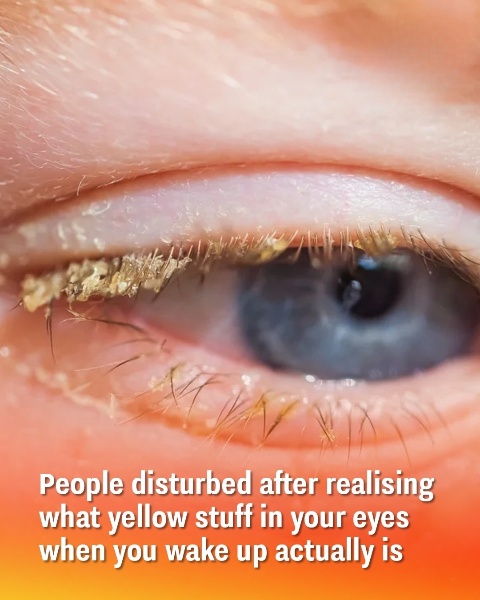
Waking up with a little yellowish gunk in the corners of your eyes is something almost everyone experiences. Most of us wipe it away without giving it a second thought. But have you ever stopped to wonder what that stuff actually is — and what it might be telling you about your health?
The truth behind that sticky substance has surprised (and even unsettled) many people once they learned the real reason it forms. Let’s take a closer look at what’s happening in your eyes while you sleep and when you should pay extra attention to it.
What Is the Yellow Gunk in Your Eyes?
That crusty yellow material you find in the corners of your eyes after a night’s sleep is called rheum. Rheum is made up of a mix of mucus, oil, skin cells, and other debris that builds up while your body rests.
During the day, we blink constantly, and blinking helps naturally clear away this material. But when you’re asleep, your eyes aren’t blinking, which means all that mucus and debris accumulate and dry out, creating that familiar crust in the corners of your eyes.
In small amounts, it’s perfectly normal and nothing to worry about. It’s actually a sign that your eyes are doing exactly what they’re supposed to do — clearing away impurities and staying healthy.
Why Does It Sometimes Look Yellow?
The yellowish tint is due to the natural composition of the discharge. Mucus itself can have a slight yellow or off-white color because of the proteins and lipids it contains.
However, if you notice that the discharge is very thick, dark yellow, green, or comes with other symptoms like eye redness, pain, or blurred vision, it could signal an infection, such as conjunctivitis (commonly known as pink eye).
In other words, a little yellow gunk? Normal. A lot of dark or greenish gunk, especially with discomfort? Time to call your doctor.
What Causes Eye Discharge to Increase?
While a small amount of eye discharge is normal, there are situations where you might notice more buildup than usual. Here are some common causes:
1. Allergies
Seasonal allergies, pet dander, dust mites — all of these can irritate your eyes, causing them to produce more mucus and tears. You might notice more discharge in the mornings if you’ve been exposed to allergens.
2. Dry Eyes
When your eyes don’t produce enough quality tears, they can become irritated, leading to excess mucus production. Paradoxically, dry eyes often cause the body to overcompensate by making more tears — but those tears are often poor quality, leading to more crusty buildup.
3. Eye Infections
Bacterial or viral infections, such as conjunctivitis, can cause excessive, colored discharge. This usually comes along with redness, itching, and swelling.
4. Blocked Tear Ducts
Tear ducts help drain tears away from the eye. If they get blocked — which is common in infants but can happen to adults too — it can cause a buildup of mucus and discharge.
5. Contact Lenses
Wearing contact lenses, especially if they’re worn too long or not cleaned properly, can irritate your eyes and increase mucus production. Always make sure you’re using lenses as directed to avoid complications.
When Should You Worry?
While normal sleep-related eye gunk is harmless, you should see a doctor if you notice:
-
Thick, green, or dark yellow discharge
-
Redness, swelling, or pain in your eyes
-
Sensitivity to light
-
Blurred vision
-
Persistent or worsening symptoms
These could indicate infections or other underlying issues that need professional treatment.
How to Keep Your Eyes Healthy
Good eye hygiene can help reduce irritation and keep your eyes comfortable. Here are a few easy habits to adopt:
-
Wash your face regularly. This helps remove allergens, dust, and bacteria that could irritate your eyes.
-
Avoid rubbing your eyes. Your hands carry germs that can cause infections.
-
Change pillowcases frequently. Pillowcases can harbor bacteria, allergens, and oils that contribute to eye irritation.
-
Use a warm compress. If you’re dealing with mild eye discomfort, placing a warm, damp cloth over your closed eyes for a few minutes can help soothe irritation and encourage natural drainage.
-
Stay hydrated. Proper hydration helps your body, including your eyes, maintain healthy moisture levels.
-
Manage allergies. Over-the-counter antihistamines or prescription medications can help if allergies are causing eye issues.
If you wear contact lenses, be especially diligent about cleaning and replacing them as directed to avoid unnecessary irritation.
Final Thoughts
The next time you wake up and notice a little yellow crust in your eyes, you don’t need to panic. In most cases, it’s just your body doing its job while you sleep, clearing away dust, oils, and other tiny invaders.
However, being aware of the signs that something more serious could be going on helps you stay proactive about your health. If something seems off — if your eyes are red, painful, or producing unusually thick or colored discharge — don’t hesitate to check with your doctor.
Our eyes are incredibly delicate and essential to our daily lives. Taking small steps to care for them can make a big difference in keeping your vision sharp and your eyes healthy for years to come.
So, go ahead — wipe that sleep from your eyes — but do it with a little more understanding of just how amazing your body really is.





